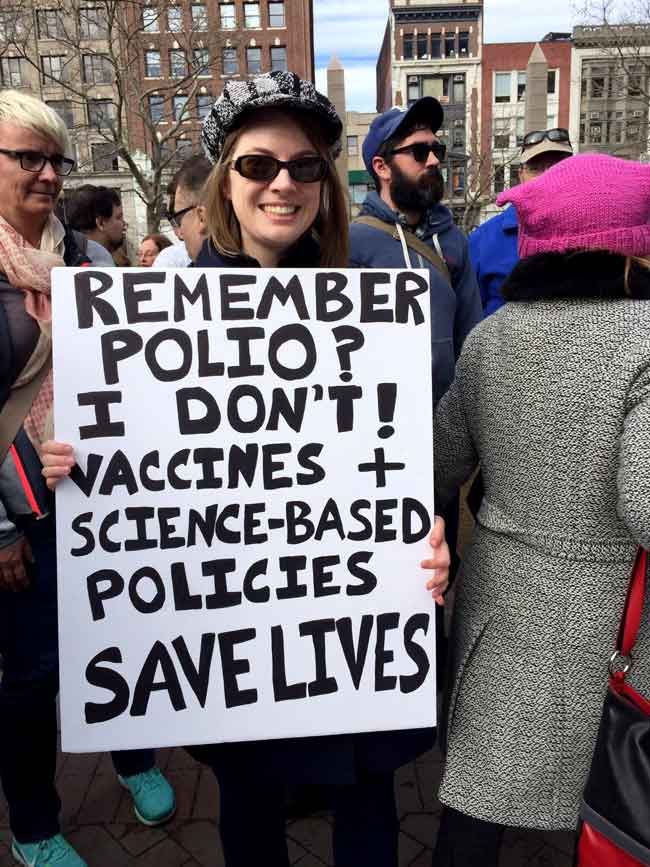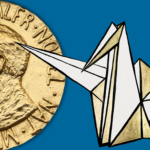Why scientists should march
By Rush D. Holt | April 11, 2018

Marching at a pro-science rally in Boston in 2017.
This Saturday, April 14, thousands of scientists and friends of science will take part in the second March for Science, in dozens of cities around the world. Just like last year, we march to share the good news about science: marvelous, beautiful advances continue toward new cures, better predictions, and useful spin-offs.
But it is not simply the practical spin-offs or even the lifesaving medicines that are the goal of science and engineering. Every day in laboratories, observatories, and classrooms, researchers and teachers demonstrate again and again the power and relevance of the scientific process. Its importance is not so much the inventions, or the established facts, or the precision equipment of science, but the very idea of science as a unique means of knowing. Biologist and essayist Lewis Thomas called science “the shrewdest maneuver” for gaining knowledge, a way of asking questions that can be answered with evidence, and the evidence can be verified in open communication. We march to celebrate the greatest spinoff of science—science itself, the most powerful way of thinking developed in the past half millennium.
Science is the route to the most reliable knowledge of how things are. Science can be the basis for the best decisions about any public matters. In making public decisions, it is best to begin with the best understanding of how things actually are—before introducing political preferences, balancing competing interests, or making value judgments. Unfortunately, all too often we see that what has been learned from science, and even the science itself, is ignored. That is the position in which we find ourselves today.
Why do we march now? Because it is too important to keep quiet. Scientists and friends of science have been taking for granted that the conditions for science to thrive will always exist. For too long, we have enjoyed using this shrewdest maneuver and neglected to consider whether the society which allows us—even funds us—to do the scientific work fully appreciates it. Scientists are now realizing not only how precious science is, but how fragile. We have thought that this way of thinking is robust and its successes are very clear for all to see. Yet many now realize that there are those who would neglect science, who would interfere with the process, and who would even reject the value of the scientific process. It is not simply adequate public funding of science that is necessary; understanding and trust must come first.
The public must have enough understanding of what science is, how it works, and what benefits it brings in order to grant scientists the freedom to choose the problems that are ripe for study, the freedom to choose collaborators, and the support to do the work. Scientists cannot do their work without the embrace (or at least the acceptance and toleration) of the public. Ignorance, opponents, and special interests interfere. We must step out into the public square and speak up.
It becomes necessary to march.
And what message should we carry? That science is for everyone! Certainly, the benefits and discoveries of science are a public good. There is more, though. The scientific way of thinking and the use of evidence to reach conclusions is available to everyone, too. Many people, if they think about science at all, think science is just something that scientists do. And they think that only scientists can do it. They are accustomed to the idea of scientific authorities declaring that this or that claim is a true fact and the other claim is false. They are accustomed to scientific conclusions handed down from experts. They get out of the habit of looking at evidence, and even forget to ask for evidence. We need the public not only to tolerate science but to practice it, to get back into the habit of evidence-based thinking, to demand evidence when confronted with any public issue.
It is by enlisting the public in scientific thinking that we gain their appreciation and support. Science practiced in cloistered labs, out of public view, becomes irrelevant and meager. We march to show the public dimension of science.
The American Association for the Advancement of Science (AAAS) supports the March for Science and encourages its members—and all those who care about evidence and rational thinking—to join us in marching. For more than a century-and-a-half, the AAAS—120,000 strong, around the world—has embodied its mission “to advance science and engineering for the benefit of all people.” In service of this goal, this organization works to set high standards for the practice and application of science and engineering, and to advocate for conditions under which science can thrive—including a society and government that provide essential freedoms and support. As a trusted source and communicator of scientific information, AAAS seeks to ensure that science and engineering are well integrated into society and government at all levels.
With respect to climate, vaccination, gun safety, public health, education, and every other public issue, we insist evidence must be the starting place for making decisions. Yet far too many people are not embracing evidence, and instead substituting opinion, ideological assertion, or sheer wishful thinking. And so, we join hundreds of organizations and many thousands of individuals to March for Science this April 14.
Editor’s note: The accompanying photo is courtesy of epidemiologist Kathleen Bachynski, who wrote about her first-hand experience marching in the Boston pro-science rally in a Bulletin Voices of Tomorrow essay last spring.
Together, we make the world safer.
The Bulletin elevates expert voices above the noise. But as an independent nonprofit organization, our operations depend on the support of readers like you. Help us continue to deliver quality journalism that holds leaders accountable. Your support of our work at any level is important. In return, we promise our coverage will be understandable, influential, vigilant, solution-oriented, and fair-minded. Together we can make a difference.
Topics: Analysis















